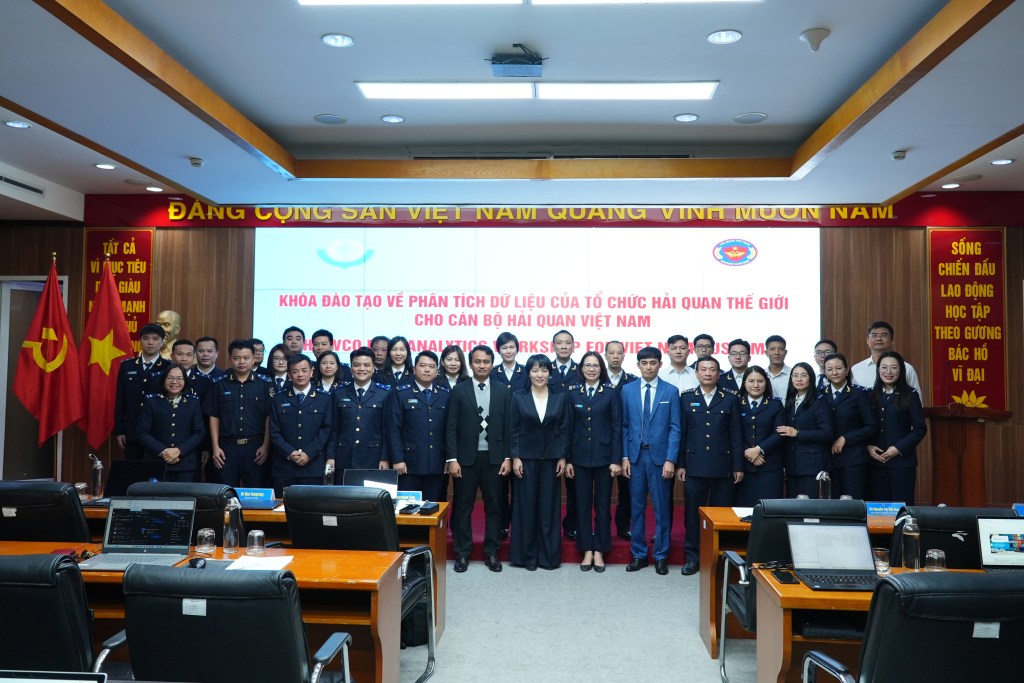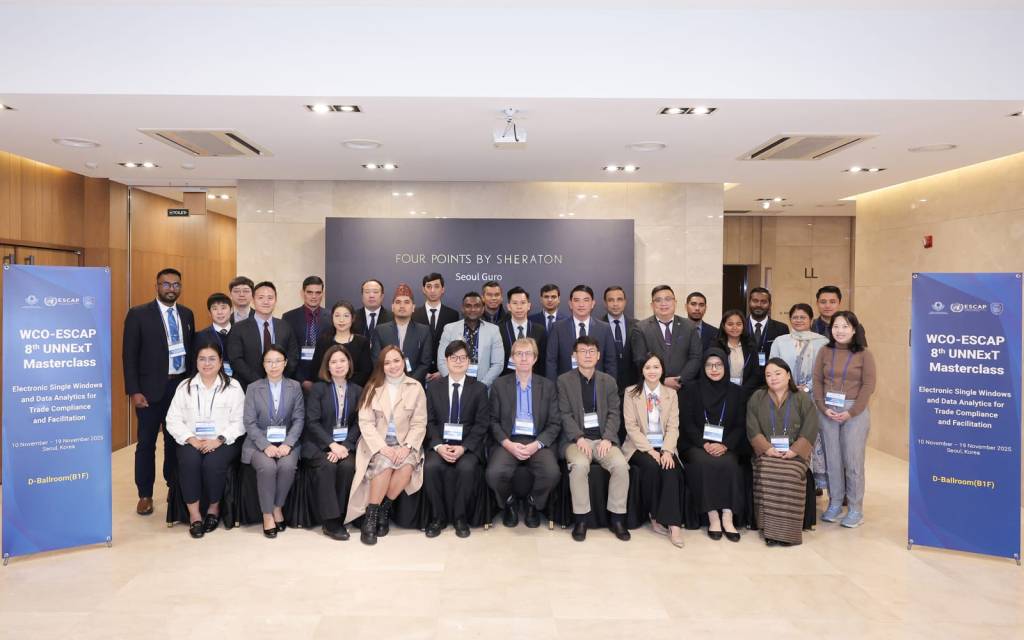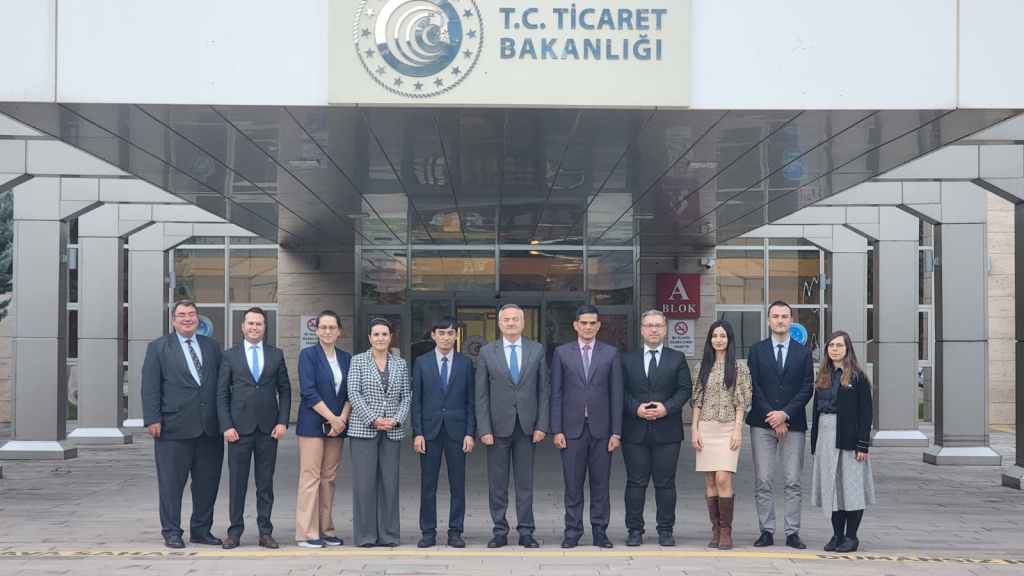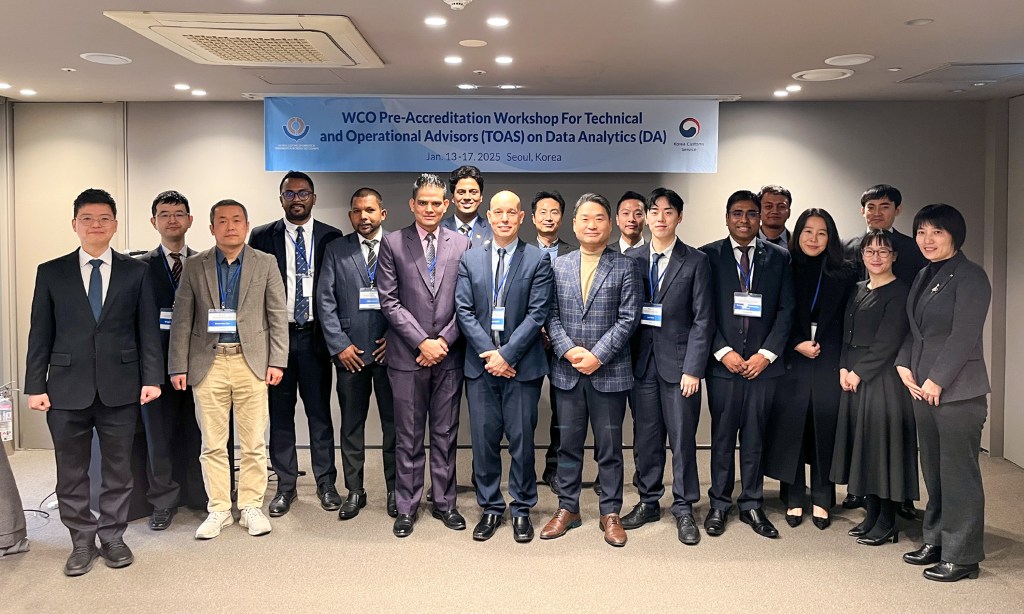
Funding
Customs Cooperation Fund of Korea (CCF-K)

Algorithms
Two Customs Algorithms: “HS code recommendation algorithm” and “DATE algorithm for detecting undervaluation”

Virtual Reality
Two VR-based Customs trainings: “Cargo Inspection at a Maritime Port” and “Air Cargo Clearance with emphasis on e-commerce”

Scholarships
Three scholarship programmes: “Data Analytics” and “Small Island Economies”
Recent news
The WCO BACUDA Project in a nutshell
When?
The BACUDA project was implemented in 2019.
Why?
The BACUDA project aims at raising awareness and at building capacity in Data Analytics among WCO Members.
How?
The project team works closely with BACUDA expert groups from academia and research institutes to develop methodologies for Customs purposes to be deployed among Member Customs Administrations. The project is funded by the Customs Cooperation Fund of Korea (CCF-K).
What?
The project conducts regional and national workshops to raise awareness and share Members’ examples of good practices in the area of Data Analytics. The project’s achievements include the development of basic algorithms on the WCO website.

Data Analytics for Customs
The use of data by Customs is not new. However, Big Data and algorithms are certainly providing new opportunities for Customs, while also raising new challenges in the implementation of Data Analytics. Such challenges require specific approaches to be considered, as well as specific policy attention to develop the appropriate organizational and technical capabilities needed to take advantage of the explosion in data, and to gain the insights that will help Customs make better informed decisions.
Over the past few years, the Secretariat has made numerous efforts to raise awareness among WCO Members about the potential benefits of data analytics, and to support them in their journey towards a successful implementation of the analytics function. While these efforts have proven to be beneficial to Members to engage in the analytics journey, there was clearly a need
to complement them with measures pertaining to other dimensions of institutional capacity building which are outlined in this leaflet.
The BACUDA expert team delivers state-of-the-art methods and training material to meet the demands of Members
Stay up-to-date with all the recent developments
Capacity Building Framework for Data Analytics

The 82nd Session of the Policy Commission that was held in December 2019, in Seoul, South Korea, recognized that building Organizational Capacity for analytics in Customs required more than just the availability of tools, applications and solutions and thereby endorsed the recommendation to develop a dedicated Capacity Building Framework for Data Analytics which would form part of the WCO Capacity Building tools and serve as a guide to formulate, monitor, and evaluate activities for organizational analytics development in Customs.
Click here to download the Capacity Building Framework for Data Analytics
HS Code Recommendation Algorithm
HS misclassification is very common, and the most difficult task in international trade. 1 out of 3 customs entries is misclassified, and tens of billions in duties is incorrectly paid. Moreover, HS classification remains a manual and time-consuming process, requiring deep domain expertise and years of experience. Using text embedding techniques, the item/product descriptions that are semantically similar can be grouped together. Basically, this analytic model converts the given product description into vectors, a numeric representation of import declarations, then calculates the distances between the declarations and provides the predictions of the appropriate HS codes as a recommendation. The algorithmic model consists of five stages: data preparation, data preprocessing, data sampling, modeling and training. The core stage is the modeling Doc2Vec classifier with the given product descriptions and the HS codes. The trained model can make recommendations based on its similarity calculations
AI-HS
Are you looking for an opportunity to participate in a pilot project?
WCO Members can contact the BACUDA Project team to organize a pilot for joint algorithm testing with their data.
As part of a pilot project, volunteering Members will provide past import and export data which will be used to test our algorithms online. In the second phase, these algorithms may then be deployed, based on the Member’s needs, on real-time data at a designated port.
It is recommended that Members visit the Data Analytics advanced level E-Learning course to learn how these algorithms work.

DATE algorithm for detecting undervaluation
This model employs a cutting-edge mechanism; “ATTENTION”, a rising superstar for AI-based language translation and self-driving cars. Thanks to this up-to-date technology, the model outperforms other traditional machine learning models (such as XGBoost) in fraud detection. Notably, the model also performs better with relatively small-sized training data (of countries with low trade volumes) and low inspection rates (of countries with huge trade volumes).
Customs training with the use of immersive Virtual Reality
Learners are able to immerse into a virtual world with actual scenarios without real-life risks. Practical exercises can be repeated as many times as it takes for each to get it perfect before the learner implements their knowledge in the real world.


WCO VR Training Set
Composed of the VR kiosk, 2 base stations, high-end PC, 50-inch screen, 2 VR controllers and the VR headset

1.1 million € invested by the Customs Cooperation Fund of Korea
32 VR Training Sets Donated: 26 WCO Regional Training Centres (RTCs) and 6 WCO Regional Offices for Capacity Building (ROCBs)
Click here to read the Newsletter #1 – December 2022 and the Newsletter #2 – March 2023
Cargo Inspection at a Maritime Port VR training
With the help of VR devices and a cyber master, a trainee is requested to select one of three individual scenarios and detect contraband items such as drugs, counterfeit goods and arms smuggled in imported cargo. After selecting one case, documents have to be compared and discrepancies identified. The program presents the necessary steps to wear safety gear, to inspect the exterior of the container, to scan it with a ZBV vehicle and to study the X-ray black and white and coloured images. The learner is also provided with the opportunity to inspect the container with tools such as a chisel, a magnifying glass, a scanner, and others at a bonded area of a dedicated warehouse.

Air Cargo Clearance emphasis on e-commerce
Currently under development
We take a collaborative approach to Customs capacity building. We work closely with Members, academic institutions, and other stakeholders to conceptualize, plan, and implement capacity building projects that utilize new technologies and expert insights to enhance efficiency and streamline operations.

Scholarship programmes
Three programmes aiming at upskilling Customs officers on Data Analytics and other core Customs functions.

WCO Small Island Economies (SIEs) Scholarship Programme
Assisting Smaill Island Economies with integrating into the global supply chain

WCO BACUDA Scholarship Programme on Customs Data Analytics
Boosting Members’ capacities in the
area of Data Analytics

Executive Programme in Customs and Business Administration (EPCBA)
Upskilling management-level officials from developing Customs administrations
15 WCO E-Learning Courses on Data Analytics
Without any limit, every Customs official can enjoy the E-Learning courses available on CLiKC!.
To register, follow the simple steps below:
1. Go to the CLiKC! home page: https://clikc.wcoomd.org
2. Select the “Get registered” tab at the bottom of the page
2. Complete and submit the registration form, and wait for your account request to be approved by your country’s National Coordinator

Beginners
#1
–

Data Analytics Beginners Course
This course is for beginners who want to learn the basics of data analytics and machine learning.
Enroll today:
Intermediate
#2
–

Intermediate Data Analytics Course
This course is for intermediate learners who understood the basics of machine learning and python programming.
Enroll today:
Advanced – 1
#3
–

Data Analytics – Advanced (HS Recommendation)
This course is for students having intermediate-level knowledge of Python and Machine Learning.
Enroll now:
Advanced – 2
#4
–

Data Analytics – Advanced (LITE DATE: Fraud Detection)
This course is for students having intermediate-level knowledge of Python and Machine Learning.
Enroll now:
Advanced – 3
#5
–

Data Analytics – Advanced (Synthetic Data Generation)
This course is for students having intermediate-level knowledge of Python and Machine Learning.
Enroll now:
Advanced – 4
#6
–

Data Analytics – Advanced (Data Quality Management)
This course is for students having intermediate-level knowledge of Python and Machine Learning.
Enroll now:
Advanced – 5
#6
–

Data Analytics – Advanced (Image Data Analysis)
This course is for students having intermediate-level knowledge of Python and Machine Learning.
Enroll now:

WCO CLiKC! E-Learning Portal
WCO Data Analytics courses are available on CLiKC! which is only accessible to Customs officers.

Certificates
A Certificate of Achievement is provided to all learners following the completion of each course.

Languages
WCO Data Analytics courses are available in both English and French. The Beginners course is also available in Spanish, Arabic and Russian.

Data Analytics Beginners E-Learning Course
The Beginners course is the one with the most enrollments on the WCO CLiKC! E-Learning Portal since January 2021.

Enrollments
Over 4000 course enrollments on the WCO Data Analytics E-Learning courses developed by the WCO BACUDA Project with the financial support of the Customs Cooperation Fund of Korea.



